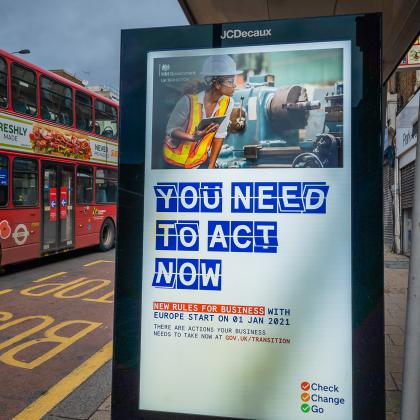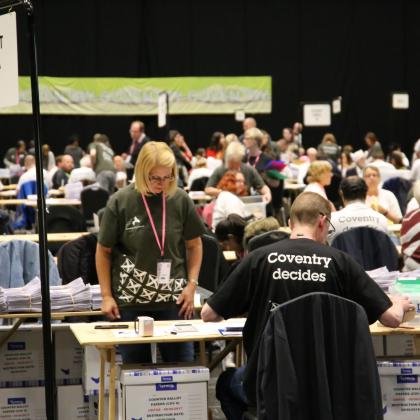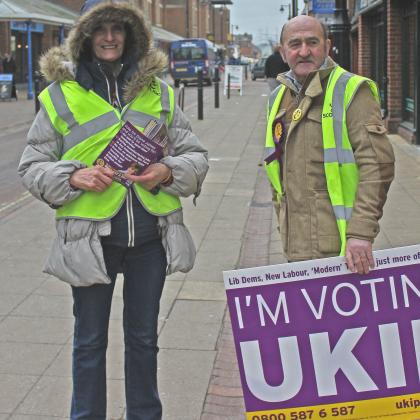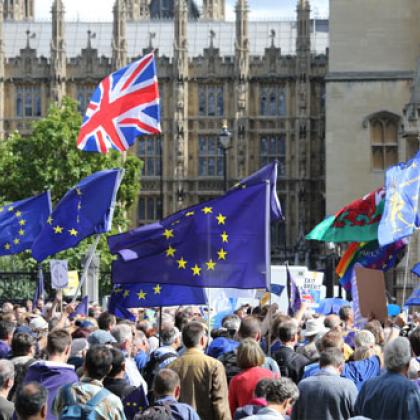James Tilley
MA DPhil (Oxon)
Research
I work primarily in the fields of public opinion and electoral behaviour, with a focus on Britain and the EU. My research over the last decade or so has had three main themes:
First, trying to explain the circumstances in which voters blame some governments for policy failures, but are willing to absolve other governments of responsibility for exactly the same problems. In 2014, I published a book, with Sara Hobolt (LSE), that examines these questions at the EU level called Blaming Europe: Responsibility without accountability in the European Union.
Second, trying to explain the changing role of social cleavages (class and religion) in predicting party choice. In 2017, I published, with Geoff Evans (Oxford), The New Politics of Class: The political exclusion of the British working class. This documents how changes to the British political parties over the last 60 years depressed class voting and increased working class abstention.
Third, and more recently, trying to understand the creation of political identity groups, especially the emergence of ‘Remainers’ and ‘Leavers’ after the EU referendum in 2016. There are various strands to this research, but most focus on testing the relative importance of innate personality traits and socialisation (especially 'echo-chambers') in explaining why party and Brexit identities are more central for some people than others. I am currently working on a book with Sara Hobolt (LSE) which brings together much of this research.
I also have continuing research interests in: how ageing affects political attitudes; Northern Irish electoral behaviour; economic voting; political trust.
Teaching
Political Sociology (lectures and tutorials for PPE/HP).
Prelims Politics (tutorials for PPE/HP).
Media
I occasionally do some media things. In particular, I have written and presented some radio documentaries for BBC Radio 4 as below.
2024: 'The Kids Are Alt-Right?'. This had five parts: episode 1 (What's Going On?); episode 2 (Getting Older); episode 3 (The Next Generation); episode 4 (The Marketplace of Politics); and episode 5 (None of the Above).
2022: 'What's the Point of Protesting?'.
2021: 'Personality Politics'.
2020: 'Do Voters Need Therapy?'.
2019: 'Let's Raise the Voting Age!' and 'Conspiracy Politics'.
2018: 'The Dictator's Survival Guide'. A different version of this, called 'How Do Dictators Survive So Long?', also appeared on the World Service.
2017: ‘Primate Politics’, after which I ended up talking chimpanzees with Iain Duncan Smith on the Daily Politics. A shorter version of this, called 'What Can Chimps Teach Us About Politics?', also appeared on the World Service.

Publications
Books
Geoff Evans and James Tilley (2017), The New Politics of Class: The political exclusion of the British working class (Oxford: Oxford University Press) (read a review in the Guardian by Terry Eagleton).
Sara Hobolt and James Tilley (2014), Blaming Europe? Responsibility without accountability in the European Union (Oxford: Oxford University Press).
Journal articles
Albert Ward, James Tilley and Sara Hobolt (2025), Why regional spending doesn’t affect support for the European Union, Journal of European Public Policy (forthcoming).
James Tilley and Sara Hobolt (2025), Narcissism and affective polarization, Political Behavior (forthcoming).
Tiphaine Le Corre and James Tilley (2025), To what extent does asylum policy match public policy preferences?, International Migration Review (forthcoming)
James Tilley and Sara Hobolt (2025), The effect of politically homogenous neighbourhoods on affective polarization: Evidence from Britain, European Journal of Political Research 64(2): 930-942.
Edmund Kelly and James Tilley (2024), Misconduct by voters’ own representatives does not affect voters’ generalized political trust, British Journal of Political Science 54(4): 1496-1505.
Sara Hobolt, Katharina Lawall and James Tilley (2024), The polarizing effect of partisan echo chambers, American Political Science Review 118(3): 1464-1479.
James Tilley and Sara Hobolt (2024), Losers' consent and emotions in the aftermath of the Brexit referendum, West European Politics 47(5): 1180-1198.
Zack Grant and James Tilley (2023), Why the left has more to lose from ideological convergence than the right, Party Politics 29(5): 803-816.
James Tilley and Sara Hobolt (2023), Brexit as an identity: Political identities and policy norms, PS: Political Science and Politics 56(4): 546-552.
John Garry, Jamie Pow, John Coakley, David Farrell, Brendan O'Leary and James Tilley (2022), The perception of the legitimacy of Citizens’ Assemblies in deeply divided places, Government and Opposition 57(3): 532-551.
Sara Hobolt, James Tilley and Thomas Leeper (2022), Policy preferences and policy legitimacy after referendums: Evidence from the Brexit negotiations, Political Behavior 44: 839-858.
Sara Hobolt, Thomas Leeper and James Tilley (2021), Divided by the vote: Affective polarization in the wake of the Brexit referendum, British Journal of Political Science 51(4): 1476-1493.
James Tilley, John Garry and Neil Matthews (2021), The evolution of party policy and cleavage voting under power-sharing in Northern Ireland, Government and Opposition 56(2): 226-244.
Sara Hobolt and James Tilley (2021), British public opinion towards EU membership, Public Opinion Quarterly 85(4): 1126-1150.
Josh Robison, Rune Stubager, Mads Thau and James Tilley (2021), Does class-based campaigning work? How working class appeals attract and polarise voters, Comparative Political Studies 54(5): 723-752.
Thomas Leeper, Sara Hobolt and James Tilley (2020), Measuring subgroup preferences in conjoint experiments, Political Analysis 28(2): 207-221.
John Garry, James Tilley, Neil Matthews, Fernando Mendez and Jonathan Wheatley (2019), Does receiving advice from Voter Advice Applications (VAAs) affect public opinion in deeply divided societies?, Party Politics 25(6): 854-861.
Zack Grant and James Tilley (2019), Fertile soil: Explaining variation in the success of Green parties, West European Politics 42(3): 495-516.
James Tilley, Anja Neundorf and Sara Hobolt (2018), When the pound in people's pocket matters: How changes to personal financial circumstances affect party choice, Journal of Politics 80(2): 555-569.
Rune Stubager, James Tilley, Geoff Evans, Joshua Robison and Gitte Sommer Harrits (2018), In the eye of the beholder: What determines how people sort others into social classes, Social Science Research 76: 132-143.
Catherine de Vries, Sara Hobolt and James Tilley (2018), Facing up to the facts: What causes economic perceptions?, Electoral Studies 51: 115-122.
James Tilley and Geoff Evans (2017), The New Politics of Class after the 2017 General Election, The Political Quarterly 88(4): 710-715.
Sara Hobolt and James Tilley (2016), Fleeing the centre: The rise of challenger parties in the aftermath of the Euro crisis, West European Politics 39(5): 971-991.
James Tilley (2015), 'We don't do God?' Religion and party choice in Britain, British Journal of Political Science 45(4): 907-927.
John Garry and James Tilley (2015), Inequality, state ownership and the EU: How economic context and economic ideology shape support for the EU, European Union Politics 16(1): 139-154.
Sara Hobolt and James Tilley (2014), Who's in charge? How voters attribute responsibility within the EU, Comparative Political Studies 47(6): 795-819.
James Tilley and Geoff Evans (2014), Ageing and generational effects on vote choice: Combining cross-sectional and panel data to estimate APC effects, Electoral Studies 33(1): 19-27.
Sara Hobolt, James Tilley and Susan Banducci (2013), Clarity of responsibility: How government cohesion conditions performance voting, European Journal of Political Research 52(2): 164-187.
Sara Hobolt, James Tilley and Jill Wittrock (2012), Listening to the government: How information shapes responsibility attributions, Political Behavior 35(1): 153-174.
Geoff Evans and James Tilley (2012), The depoliticization of inequality and redistribution: Explaining the decline of class voting, Journal of Politics 74(4): 963-976.
Robert Ford, James Tilley and Anthony Heath (2012), Land of my fathers: Economic development, ethnic division and ethnic national identity in 32 countries, Sociological Research Online 16(4).
Geoff Evans and James Tilley (2012), How parties shape class politics: Explaining the decline of the class basis of party support, British Journal of Political Science 42(1): 137-161.
James Tilley and Sara Hobolt (2011), Is the government to blame? An experimental test of how partisanship shapes perceptions of performance and responsibility, Journal of Politics 73(2): 316-330.
James Tilley and Geoff Evans (2011), Political generations in Northern Ireland, European Journal of Political Research 50(5): 583-608.
Michael Marsh and James Tilley (2010), The attribution of credit and blame to governments and its impact on vote choice, British Journal of Political Science 40(1): 115-134.
John Garry and James Tilley (2009), Attitudes towards European integration: Investigating East-West heterogeneity, Journal of European Integration 31(5): 537-549.
John Garry and James Tilley (2009), The macroeconomic factors conditioning the impact of identity on attitudes towards the EU, European Union Politics 10(3): 361-379.
Sara Hobolt, Jae-Jae Spoon and James Tilley (2009), A vote against Europe? Explaining defection at the 1999 and 2004 European Parliament elections, British Journal of Political Science 39(1): 93-115.
James Tilley, Geoff Evans and Claire Mitchell (2008), Consociationalism and the evolution of political cleavages in Northern Ireland, 1989-2004, British Journal of Political Science 38(4): 699-717.
Claire Mitchell and James Tilley (2008), Disaggregating conservative Protestant groups in Northern Ireland: Overlapping categories and the importance of a born-again self-identification, Journal for the Scientific Study of Religion 47(4): 734-748.
James Tilley, John Garry and Tessa Bold (2008), Perceptions and reality: Economic voting at the 2004 European Parliament elections, European Journal of Political Research 47(5): 665-686.
James Tilley and Christopher Wlezien (2008), Does political information matter? An experimental test relating to party positions on European integration, Political Studies 56(1): 192-214.
James Tilley and Anthony Heath (2007), The decline of British national pride, British Journal of Sociology 58(4): 661-678.
James Tilley (2005), Contracts, compacts and control: New Labour and personal responsibility, Political Quarterly 76(2): 299-301.
Robert Andersen, James Tilley and Anthony Heath (2005), Political knowledge and enlightened preferences: Party choice through the electoral cycle, British Journal of Political Science 35(2): 285-302.
James Tilley (2005), Libertarian-authoritarian value change in Britain, 1974-2001, Political Studies 53(2): 442-453.
Anthony Heath and James Tilley (2005), British national identity and attitudes towards immigration, International Journal on Multicultural Societies 7(2): 119-132.
Claire Mitchell and James Tilley (2004), The moral minority: Evangelical Protestants in Northern Ireland and their political behaviour, Political Studies 52(2): 585-602.
James Tilley (2003), Secularisation and ageing in Britain: Does family formation cause greater religiosity?, Journal for the Scientific Study of Religion 42(2): 269-278.
John Garry and James Tilley (2003), Fianna Fail activists: Coalition preferences and policy priorities, Irish Political Studies 18(2): 82-88.
James Tilley (2003), Party identification in Britain: Does length of time in the electorate affect strength of partisanship?, British Journal of Political Science 33(2): 332-344.
James Tilley (2002), Is youth a better predictor of socio-political values than nationality?, Annals of the American Academy of Political and Social Science 580(1): 226-256.
James Tilley (2002), Political generations and partisanship in the UK, 1964-1997, Journal of the Royal Statistical Society: Series A (Statistics in Society) 165(1): 121-135.
Book chapters
James Tilley (2023), The resilience of religion as an electoral divide, in José Ramón Montero, Paolo Segatti and Kerman Calvo (eds.), Religious Voting in Western Democracies. Oxford: Oxford University Press.
James Tilley and John Garry (2017), Class politics in Ireland: How economic catastrophe realigned Irish politics along economic divisions, in Michael Marsh, David Farrell and Gail McElroy (eds.), A Conservative Revolution? Electoral change in 21st century Ireland. Oxford: Oxford University Press.
James Tilley (2016), We don't do God? Religion and vote choice in Britain, in Philip Cowley and Robert Ford (eds.), More Sex, Lies and the Ballot Box. London: Biteback.
James Tilley (2014), A classless society?, in Philip Cowley and Robert Ford (eds.), Sex, Lies and the Ballot Box. London: Biteback.
Geoff Evans and James Tilley (2012), Ideological convergence and the decline of class voting in Britain, in Geoff Evans and Nan Dirk de Graaf (eds.), Political Choice Matters: Explaining the strength of class and religious cleavages in cross-national perspective. Oxford University Press.
Geoff Evans and James Tilley (2011), Private schools and public divisions: The influence of private schooling on social attitudes and political choices, in Alison Park et al (eds.), British Social Attitudes: The 28th Report. London: Sage.
John Garry and James Tilley (2007), Public support for integration in the newly enlarged EU, in Michael Marsh, Slava Mikhaylov and Hermann Schmitt (eds.) European Elections after Eastern Enlargement. Mannheim: CONNEX.
James Tilley, Anthony Heath and Sonia Exley (2004), Dimensions of British identity, in Alison Park et al (eds.), British Social Attitudes: The 21st Report. London: Sage.
Related News
Back
More



























